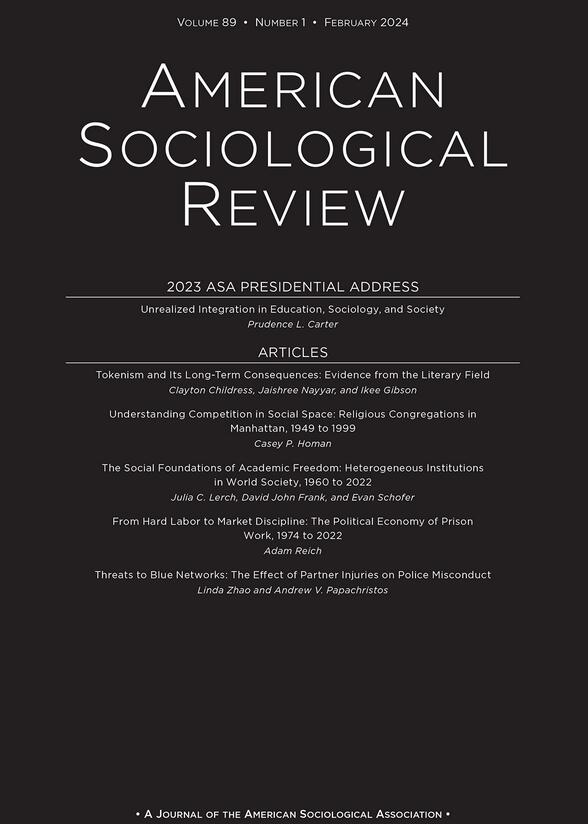Higher Education and the Black-White Earnings Gap
IF 6.2
1区 社会学
Q1 SOCIOLOGY
引用次数: 1
Abstract
How does higher education shape the Black-White earnings gap? It may help close the gap if Black youth benefit more from attending and completing college than do White youth. On the other hand, Black college-goers are less likely to complete college relative to White students, and this disparity in degree completion helps reproduce racial inequality. In this study, we use a novel causal decomposition and a debiased machine learning method to isolate, quantify, and explain the equalizing and stratifying roles of college. Analyzing data from the NLSY97, we find that a bachelor’s degree has a strong equalizing effect on earnings among men (albeit not among women); yet, at the population level, this equalizing effect is partly offset by unequal likelihoods of bachelor’s completion between Black and White students. Moreover, a bachelor’s degree narrows the male Black-White earnings gap not by reducing the influence of class background and pre-college academic ability, but by lessening the “unexplained” penalty of being Black in the labor market. To illuminate the policy implications of our findings, we estimate counterfactual earnings gaps under a series of stylized educational interventions. We find that interventions that both boost rates of college attendance and bachelor’s completion and close racial disparities in these transitions can substantially reduce the Black-White earnings gap.高等教育与黑人-白人收入差距
高等教育如何塑造黑人与白人的收入差距?如果黑人青年比白人青年从上大学和完成大学学业中获益更多,这可能有助于缩小差距。另一方面,与白人学生相比,黑人大学生完成大学学业的可能性更低,而完成学位的这种差异有助于再现种族不平等。在这项研究中,我们使用一种新的因果分解和去偏见机器学习方法来分离、量化和解释大学的均衡和分层作用。分析NLSY97的数据,我们发现学士学位对男性的收入有很强的均衡效应(尽管对女性没有);然而,在人口水平上,这种均衡效应部分被黑人和白人学生完成学士学位的可能性不等所抵消。此外,学士学位缩小了男性黑人和白人的收入差距,不是通过减少阶级背景和大学前学术能力的影响,而是通过减少黑人在劳动力市场上“无法解释的”惩罚。为了阐明我们的研究结果的政策含义,我们在一系列程式化的教育干预下估计了反事实的收入差距。我们发现,既能提高大学出勤率和学士学位完成率,又能缩小这些转变中的种族差异的干预措施,可以大幅缩小黑人和白人的收入差距。
本文章由计算机程序翻译,如有差异,请以英文原文为准。
求助全文
约1分钟内获得全文
求助全文
来源期刊

American Sociological Review
SOCIOLOGY-
CiteScore
13.30
自引率
3.30%
发文量
35
期刊介绍:
The American Sociological Association (ASA) is a non-profit membership association established in 1905. Its mission is to advance sociology as a scientific discipline and profession that serves the public good. ASA is comprised of approximately 12,000 members including faculty members, researchers, practitioners, and students in the field of sociology. Roughly 20% of the members work in government, business, or non-profit organizations.
One of ASA's primary endeavors is the publication and dissemination of important sociological research. To this end, they founded the American Sociological Review (ASR) in 1936. ASR is the flagship journal of the association and publishes original works that are of general interest and contribute to the advancement of sociology. The journal seeks to publish new theoretical developments, research results that enhance our understanding of fundamental social processes, and significant methodological innovations. ASR welcomes submissions from all areas of sociology, placing an emphasis on exceptional quality.
Aside from ASR, ASA also publishes 14 professional journals and magazines. Additionally, they organize an annual meeting that attracts over 6,000 participants. ASA's membership consists of scholars, professionals, and students dedicated to the study and application of sociology in various domains of society.
 求助内容:
求助内容: 应助结果提醒方式:
应助结果提醒方式:


